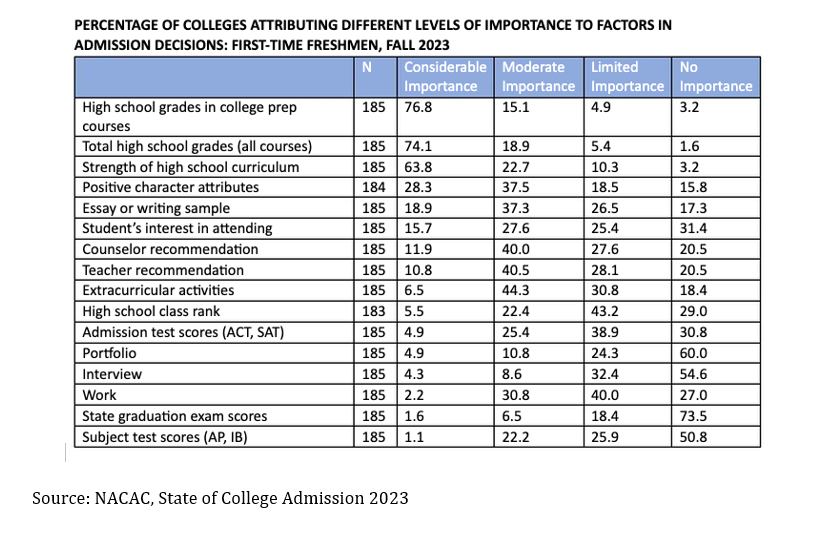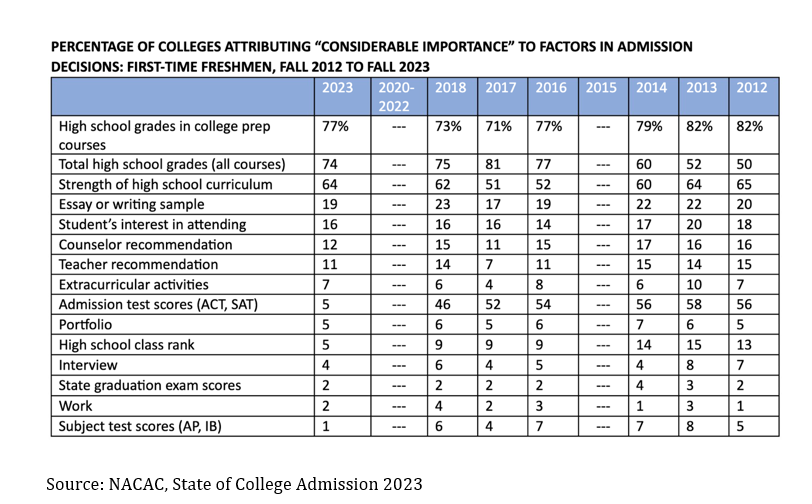 Your grades throughout high school remain the most important factor in college admissions. While colleges also look carefully at your standardized test scores, essays, recommendations, and other personal factors, they view your day in and day out academic performance in high school as the strongest predictor of your academic success in college. Covid-19 changed the way colleges use standardized testing in the admissions process as more colleges adopted a test-optional policy, leaving colleges even more reliant on your grades and rigor of your curriculum. But some colleges – including Brown, Dartmouth, MIT, Yale, and UT-Austin – recently reversed that policy and will reinstate standardized testing for fall 2024, and more are likely to follow.
Your grades throughout high school remain the most important factor in college admissions. While colleges also look carefully at your standardized test scores, essays, recommendations, and other personal factors, they view your day in and day out academic performance in high school as the strongest predictor of your academic success in college. Covid-19 changed the way colleges use standardized testing in the admissions process as more colleges adopted a test-optional policy, leaving colleges even more reliant on your grades and rigor of your curriculum. But some colleges – including Brown, Dartmouth, MIT, Yale, and UT-Austin – recently reversed that policy and will reinstate standardized testing for fall 2024, and more are likely to follow.
Grades are #1
77% of colleges surveyed by NACAC (National Association of College Admissions Counselors) give considerable importance to grades in all your courses. The chart below shows the percentage of colleges attributing different levels of importance to various admissions factors from Fall 2023.
Interestingly, the most significant change in the last decade is that “total high school grades (all courses)” has dramatically increased in importance, nearly to the level of grades in college prep courses.
Colleges typically recalculate your GPA using a standard formula, so that they can compare students from different schools with different GPA scales. Usually, colleges will use a 4.0 scale, where A+ and A = 4.0, B+ = 3.7, B- = 3.3, B = 3.0, and so on.
Why Do Grades Matter?
Admissions officers consistently say that your day in day out grades are the best predictor of your academic performance in college. Research from a collaboration among educators, policymakers, and communities in the University of Chicago‘s To & Through Project shows high school grades to be the strongest indicator of college readiness, and grades are much more predictive of college graduation than any test score.
This finding is supported by the American Educational Research Association, who found that “Students’ high school grade point averages are five times stronger than their ACT scores at predicting college graduation,” After controlling for demographic and college characteristics, “The chance of graduating from college ranges from 20 percent for students with high school GPAs under 1.5 to about 80 percent for those with GPAs of 3.75 or higher.”
While standardized test scores still play an important role, admissions staff recognize that your one-day test score may be impacted by a variety of factors such as test anxiety, inadequate sleep, lack of exposure to test-taking strategies, and test center distractions. But your grades show whether you have demonstrated persistence and focus on academic performance throughout your high school years.
Which Grades Matter?
The trend in your grades is important as well. Often students take time to adjust to the greater freedom and responsibility of high school, and this is reflected in weaker grades during freshman year. As a result, colleges typically place more emphasis on your grades in junior and senior years. Your junior year grades are included on your official transcript and colleges see your first-semester senior year grades in the Mid-Year Report (which is required by all colleges). Colleges also require your final report card for senior year and occasionally rescind their acceptance offer if your grades significantly drop.
In addition, if you are applying to a specialized field, your grades in certain courses will receive more attention. For example, for business or engineering programs, your math grades are particularly important. For pre-med, nursing, and other pre-health tracks, your science grades will be looked at closely. And for aspiring humanities majors, your grades in your English, history, and language courses will be the most relevant.
How Important is the Rigor of Your Curriculum?
Over the past decade, grades in college prep and in all courses have remained the top factors in admissions, but the next most important factor is the strength of the curriculum, which has been viewed as much more important than standardized testing over the past decade (except for 2016-2017 when it was viewed as equally important), as shown in the chart above.
Rigorous courses include accelerated, honors, AP (Advanced Placement), IB (International Baccalaureate), and dual-enrollment courses (in which you receive college credit as well). Admissions officers encourage students to take the most challenging curriculum that they can reasonably manage. Stanford University advises, “We expect you to challenge yourself throughout high school and to do very well. We want to see your commitment, dedication and genuine interest in expanding your intellectual horizons.”
Students who are especially ambitious and talented sometimes choose to take courses beyond what is offered at their high school at local colleges or online; one of the most common is Multi-Variable Calculus, which is the next course in the math sequence after AP Calculus BC, and rarely offered in secondary schools. So, if you are planning to major in a math-based field, such as engineering or physics you complete AP Calculus in junior year, and your school does not offer Multi-Variable Calculus, your candidacy would be enhanced by taking this course in senior year either online or through a local college. Similarly, students interested in pursuing art in college often take specialized art courses in their community to diversify or deepen their art experiences and help create a strong art portfolio.
For admission to the most selective colleges in the US, competitive students at public high schools typically take courses to the end of the sequence in four or five of the core curriculum subjects of English, history, language, math, and science. The “end of the sequence” would be defined as an AP-level course, AT (Advanced Topics) course, or a High-Level IB course, at secondary schools that offer these curricula.
If a student has a particular interest in one of the core subjects and is planning to major in that area, a competitive curriculum might include high-level courses in four of the five core areas, with a doubling-up in the student’s area of interest. For example, a future history major might take AP Government, AP Economics, AP Calculus (AB or BC), and an AP science, but might not take a high-level language course.
In contrast, many private schools do not offer these established curricula and instead provide high-level courses across the board, or offer specialized courses at an advanced level. For example, The Nueva School, an independent pre-K to 12 school in San Mateo, CA, promotes an inquiry-based learning approach supported by innovative courses in all fields, such as Advanced Mechanical Engineering, History of Technology, and Afterlives of Classics.
How Do Admissions Officers View Your Transcript?
Admissions staff always view your transcript within the context of your high school. Colleges recognize that schools vary greatly. As Northwestern University states, “Every secondary school is different in its level of competitiveness and in the range of courses offered. These factors are also considered when admission decisions are rendered.”
Jeannine Lalonde, Associate Dean of Admission at UVA, stresses the importance of context as well: “Methodologies differ so much that it’s impossible to know an applicant’s academic story from the GPA. The GPA attempts to summarize the work you’ve done, but we use the courses and grades on the transcript to fully understand your academic strength.”
Action Plan
We recommend that you develop a preliminary plan of courses when you begin high school as a freshman. With our students, we like to re-evaluate your plan each year, based on your academic performance, interests, college goals, and commitments to extracurricular activities. Your coursework should be your top priority in high school; at the same time try to live a balanced life with sufficient time for activities, family, friends, and sleep!
There are many ways that you can reach your potential with your academic performance. Most importantly, engage in your courses. Keep up with homework, try to review your notes regularly, and don’t wait until the last minute to study for tests or write your papers. If you need help, see your teacher, work with other students, and use review books.
The college admissions process is complex, and success requires thoughtful planning from the start of high school.
At Collegiate Gateway, we understand the stress and anxiety surrounding the college admissions process. Feel free to set up a complimentary consultation to learn about our services. Whatever your question, Collegiate Gateway is happy to help!


